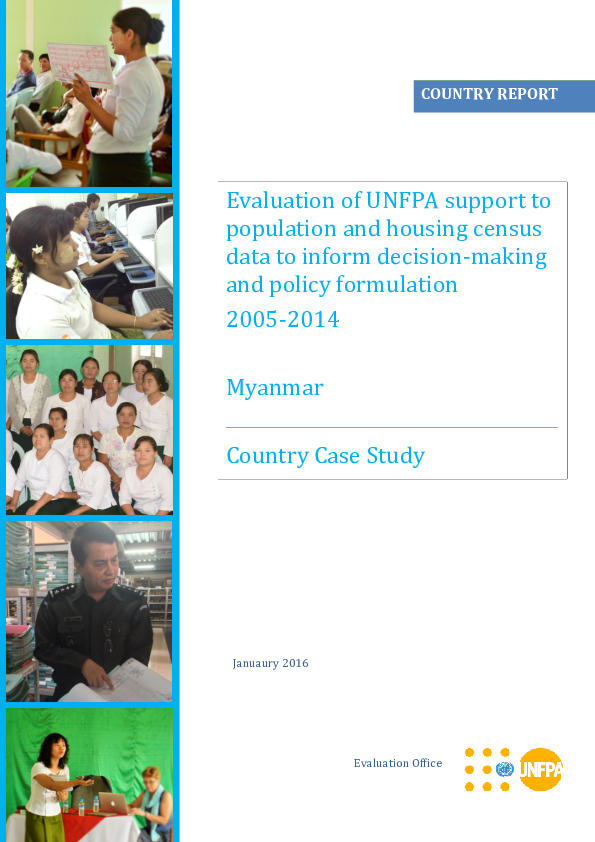
Evaluation of UNFPA support to population and housing census data to inform decision-making and policy formulation
Myanmar Country Case Study Report
Resource date: 09 March 2016
UNFPA support to the 2010 census and housing survey in Myanmar was found to be strongly aligned with the needs of national public institutions, as well as the needs for data from development partners, civil society organisations and academia. The census was implemented within the planned timeline, a fact attributable to efficient human resource mobilization, timely procurement and synergies and partnerships at country level. The contribution of UNFPA to opening mindsets on new approaches to census implementation (based on consultations inclusiveness, bridging different perspectives) was identified as one of UNFPA unique comparative strengths in the 2010 census round.
Technical advice provided by UNFPA had a positive effect on the staff of the Department of Population (the institution in charge of the census), exposing them to a comprehensive approach to quality, including through the conduct of a pilot census – the first in the history of census in Myanmar. A quality assurance strategy was put in place to ensure that census results met the highest quality possible. However, a Post Enumeration Survey was not undertaken. Should have been conducted, it would have provided a statistical measure of census coverage and elements of quality that no other source or method is able to offer. The UNFPA Asia and the Pacific Regional Office played a key role in decisive moments, including in the pilot census and responding to the media after enumeration.
The Myanmar case offers an example of provision of UNFPA census support in a highly complex political context. Underestimating the sensitivity of including a question on ethnicity in the census and misperceptions by civil society organisations and media on the scope and nature of UNFPA support, confronted the UNFPA with the complex, socio-political implications of the census in Myanmar.
UNFPA contributions have set the ground for good prospects on census data use for policy and programme development, with line ministries using the census sample frame in surveys, enhanced trust and confidence of the population in census results, linking users and producers of census data, and increased civil society organisations participation in the census process. Structural challenges, such as a lack of tertiary statistics education and the novelty of evidence-based policy-making, add to the obstacles for the creation of an enabling environment for data use.
South-South Cooperation remains very relevant for Myanmar, but could be more fully utilised. Lessons learned from the census experience will be a valuable contribution for the forthcoming 2020 census round, once they are systematically organized and documented.
Related download
-
EN
Myanmar Country Case Study Report